The Fearless Ambreen Razia
Ambreen Razia is a true artist with a vision (or several). Ever passionate about her work, she continues to learn in classes, on sets, and in her free time. Inspired by the beauty of where she comes from and of life itself, she continues to take her knowledge and experiences straight to the stage and screen with purpose.
Shirt by With Nothing Underneath
Tie by FERRAGAMO
Trousers by COS
Socks by FALKE
You are joining the Paramount+ show, The Agency, in Season 2 as a series regular. With such high-profile cast members, how did you prepare yourself going in? Do you feel you changed in any way as an actor by the end of shooting the season?
I worked with an acting coach, a body transformationalist coach, and our brilliant dialect coaches on set that I’ve worked with throughout. I believe in the power of repetition as an actor, so I read the scripts at least four times each and the scene itself hundreds of times, particularly because the John-Henry and Jez Butterworth write with such detail, and you don’t really know the score till you rehearse the scene on the day. I feel safety in making sure no stone is left unturned with my prep, and the challenge for me is learning that you have to remain open and available with this cast, because what they offer is spectacular and you don’t want to miss anything they give you. A good friend of mine runs amazing weekly Meisner classes in Hackney, East London which I try and attend regularly, some people prefer other methods, but Meisner is my personal favourite, particularly for screen. I think every project changes you in some way; on this I’ve collaborated with the likes of Michael Fassbender, Richard Gere and John Magaro amongst a cohort of ridiculously talented actors for the past six months. So yes, you’re definitely going to change and grow when you’re working with a cast like this.
You are a writer of all genres, from the screen to the stage. What do you find are the different joys and strengths of both mediums?
With stage you see your play be born, then you see it find its feet, then you see it die on closing night -there’s an ultimate end which can be overwhelming. Theatre is a continuation of life and nature where, by the end, something or someone is changed which is why there’s a vital need for it. Humans feel safe in routine, and theatre is life at its most pivotal and urgent, a series of consequences played out by choices which we may not have the luxury to do in our own lives. Screen is different, you have the opportunity to perfect a contained moment to give to the audience, which to me, is the creator saying to us; ‘I’ve interrogated this moment over and over with the hope that you will feel something unknown to you.’ I love taking what I learn from writing for screen into writing plays, things like being brutal with cuts, or even holding moments of tension between characters on stage without them saying anything.
You were recently in the writers’ rooms for the award-winning We Are Lady Parts (Channel 4/Peacock) and Extraordinary (Disney+). Where did this passion for writing begin and how have you nurtured it?
I wrote a one woman show in 2015. It was 90 minutes on stage every night on a three-month UK-wide tour, and it was terrifying and exhausting. You represent all departments: the material, the performance, the criticism and praise, the faults and the triumphs fall on you. I now look back at my twenty-two-year-old self and say, “what were you thinking”? You’re beautifully fearless and foolish at that age and I didn’t overthink anything. I have so much love for her, as challenging as it was, I had total autonomy over my work which gave me so much empowerment. It’s been wonderful over the years to support showrunners bringing their work to life. I’ve worked with some exceptionally talented and intelligent writers in these rooms, and I always leave with a spark of inspiration for my own work. Acting is my greatest love, but I didn’t want my entire profession to be based on the decisions of others.
Jewelry by Missoma
Coat by Vintage Burberry
Trousers by Gabriela Hearst
You are currently developing a drama with the BAFTA-winning Expectation TV. The show follows a British Muslim junior doctor battling addiction and her wounded family. What prompted your decision to have this specific story explored and fleshed out?
South Asian stories feel somewhat stuck at the moment. I think we haven’t moved on from the mystical retellings of historical stories, political events or tropey Asian aunties, which, admittedly, I myself have fallen into the trap of writing. I also don’t deny that those characters were a necessary part of our journey, but it’s time to shift the needle. Shows like Atlanta and Beef have moved the narrative forward for those respective communities in an interesting and dynamic way and I think it would be a shame for us to be stuck in this place which feels obsolete. My hope and desire for this show is to allow a British Pakistani family room to breathe. Like all families, they’re stood on a volcanic ground of secrets and lies which is waiting to explode. Recent films like Past Lives, with its farewells and hard truths, have been particularly inspiring in terms of allowing contained tender stories and relationships from specific cultural backgrounds to unfold organically and with dignity, truth, beauty and universality. Film is allowing for that to happen; I think television also needs to allow more room for that.
It seems that your writing has been inspired by advocacy and activism. Can you further explain how it plays a part in your art?
We’re currently in a strange place within theatre where activism and advocacy for a particular issue or cause is taking on the position of a character within the work, protesting a specific agenda or message which is troubling. I can see how my plays have argued for a cause or a group of people ensuring their voices are heard. I think activism is fine so long as it’s told through the human condition. Ken Loach does this beautifully, he’s a huge inspiration for me.
Your one woman show, The Diary of a Hounslow Girl, was adapted into a BBC show rather quickly, which you also starred in. How has growing up in West London influenced you? What makes British writers so elite?
Hounslow is in West London, but the character, Shaheeda, was essentially a young Muslim girl growing up in London who was coming of age, exploring intimacy, drugs, and by the end of the play, early motherhood. She just happened to be from Hounslow, but she could have easily been from Tooting or Whitechapel or Ilford. There’s a strong sense of London in all of my plays because I’m a proud Londoner. I wouldn’t say British playwrights are more elite than dramatists like Strindberg, Lorca or Ibsen, it’s possibly something to do with our learning of dramatic structure very early on - the Freytag Pyramid / Aristotle. When I was in the Royal Court writers’ group, you felt somewhat like an elite and you were being given an elite type of training which was wonderful as a young playwright. However, there is undeniably an elitist attitude within theatre, and the rise of ‘diversity’ didn’t solve that because within that there’s still inaccessibility and segregation. I think it comes down to deep rooted denial of the working class.
Shirt by With Nothing Underneath
Tie by FERRAGAMO
Trousers by COS
Socks by FALKE
Loafers by Grenson Shoes
Your character, Shandy Fine, is impeccably comedic in Ted Lasso. How did you go about developing her mannerisms and all-around state of mind?
I watched a lot of The Only Way Is Essex, a British reality TV show, and delved into interviews of ex glamour models and footballer’s wives. Shandy was super insecure which was an exhausting trait to play. She’s holding onto the last of her heyday, the next generation of models were about to burst through the door, and it was driving her insane. I knew what my role was and that it was an explosive comedic character who comes in for five episodes and momentarily turns Keely’s world upside down. I had the opportunity to reveal all quite quickly. Unlike Blair in The Agency, who has more screen time and therefore more opportunity to hold things back for longer. Shandy had to be formidable, intolerable, bold and memorable in a shorter time - it’s pressure in a different way.
With as much talent as you have and with how much you do, how do you avoid burn out?I think I’m always quite close to it and have experienced it before. I love my work, so it doesn’t feel like burnout till later and I have to get better at knowing when it’s on its way. I’m a homebody, cosying up to an old nostalgic film, a sweet Yorkshire tea and a bag of popcorn at my local Curzon after a long day of writing. I love cooking when I can, a good run to clear my head, spending time with my sister and close friends always fills my soul up again.
You were once a hairdresser. What lead you to pursue that path before journeying into acting?
I didn’t quite make it to being a hairdresser, but the salon I was working in were about to train me up until my drama teacher, Ms. Sawyer, who is still gracious enough to come to every one of my shows, told my mum I should pursue acting. I have a family full of strong women, spotting the man in my family is like “Where’s Wally” and they have done nothing but support and love everything I chose to do. I owe it all to them.
Outside of your career, what do you like to do when you get the chance to?
I like to dabble in psychology and philosophy books… I find those subjects fascinating. If I ever get the time to study something again, that’d be what I’d major in. Also travel - I just came back from Morocco, and it was spectacular - hearing the Azan everyday was beautiful. I saw a woman breastfeeding in the Blue Mosque in Istanbul last year, no one batted an eyelid, and I felt this immense happiness wash over me. There is so much beauty to be seen in different parts of the world.
What are you most proud of?
Where and who I come from. The women who have come before me were truly extraordinary. Every generation of women in my family have broken stereotypes and pushed the envelope in their own way - they are truly formidable! The ones gone still live in the fabric of my soul and my work, and the ones here continue to shape me into the best person I can be.
CREW CREDITS:
Talent: Ambreen Razia
PhotoBook Editor-In-Chief: Alison Hernon
PhotoBook Creative Director: Mike Ruiz
Photographer: David Reiss
Fashion Stylist: Sarah-Rose Harrison
Hair + Makeup: Rebecca Richards
PR RK PR
Tearsheets by Daniel López, Art Director, PhotoBook Magazine
Interview by Seana Watson, Associate Fashion Editor, PhotoBook Magazine






